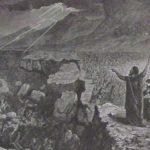We run our website the way we wished the whole internet worked: we provide high quality original content with no ads. We are funded solely by your direct support. Please consider supporting this project.

Who Rules Governments? God or Satan? Part 1
Running throughout Scripture is the motif that depicts God as the ultimate ruler of the nations. On the other hand, the NT teaches that the ruler of nations is Satan. What do we do with these two apparently conflicting motifs?
First, because OT authors tended to understand the creation along the lines of a king-centered corporate whole, and because of their on-going need to stress Yahweh’s unchallenged supremacy over-and-against the polytheism of their pagan neighbors, OT authors emphatically stress that Yahweh is the sole ruler of heaven and earth, including all the nations (e.g., Ps 22:28; 66:7). As Nebuchadnezzar eventually realized, according to the book of Daniel, Yahweh “does as he pleases with the powers of heaven and the peoples of the earth” and “[n]o one can hold back his hand or say to him: ‘What have you done?’” (Dan 4:35). As the ruler of all the nations, Yahweh can use them as his “rod” and “sword” whenever he pleases.
This conception is reflected in the NT as well when Paul instructs Christians to submit to “governing authorities” on the grounds that “[t]he authorities that exist have been established by God” (Rom 13:1). It is reflected as well in Peter’s admonition for believers to “[s]ubmit yourself for the Lord’s sake to every authority” on the grounds that political rulers have been “sent by him to punish those who do wrong …” (2 Pet 2:13-4). And it is arguably reflected in Jesus’ response to Pilate’s claim to possess the power to crucify him: “You would have no power over me,” Jesus says, “if it were not given to you from above” (Jn 19:11). This motif, considered by itself, gives the impression that God unilaterally rules all the governments of the world.
We get a very different impression, however, when we consider a second motif running throughout the NT that ascribes to Satan the rule of the kingdoms of the world. Indeed, John goes so far as to claim that “the whole world”—and this would obviously include all nations, ”is under the control of the evil one” (1 Jn 5:19). In keeping with this, Revelation teaches that “the Destroyer” has the power to deceive all the kings and nations of the world (Rev 9:11; 12:9; 13:14; 20:10). And far from God unilaterally controlling kings and nations, in Revelation we learn that God and the lamb must war against Satan and the kings of the earth to transform “the kingdom of the world” into “the kingdom of the Lord and of his Messiah (Rev 11:15).
Reflecting this same perspective, Jesus three times gives Satan the political title of “the archon [ruler] of the world” (Jn 12:31; 14:30; 16:11), and he doesn’t dispute Satan’s claim to possess all the authority of the kingdoms of the world and to be able to give this authority to anyone he wants (Lk 4:6). So too, Paul teaches that Satan is the “god of this age” (2 Cor 4:4) and the “ruler of the kingdom of the air” (Eph 2:2).
Whatever else may be said about this motif, it clearly rules out any suggestion that God unilaterally rules the world’s governments. To the contrary, considered by itself, this motif gives the impression that it is Satan, not God, who unilaterally rules the world’s governments.
The classical Augustinian explanation that God controls all that Satan does requires us to accept that the atrocities carried out by Nero, Hitler, Stalin, Amin and every other diabolic ruler the world has ever known were actually God’s will. Such a view cannot logically avoid implicating God in evil, which renders it a non-starter for those of us who anchor our conception of God in the crucified Christ.
Along the same lines, the controlling power this view ascribes to God conflicts with Paul’s revelation that the true “power of God” is identical with “the cross” (1 Cor 1:18, 24). The very fact that the type of coercive power this view ascribes to God is precisely the kind of power fallen humans have always tended to crave and have therefore always attributed to the gods further confirms that this view reflects the machinations of fallen human hearts rather than a revelation of the true nature God’s character and power. Conversely, the very fact that cross-defined power contradictions the kind of power fallen humans have craved and attributed to the gods is one good reason to suspect it is not the product of the machinations of fallen minds but rather reflects a true revelation.
An alternative approach that has been espoused by many biblical scholars is to simply accept that biblical authors espoused contradictory theologies on this matter, due to the different political contexts in which they wrote. While this conclusion may be compelling as applied to different biblical authors, I find it hard accept that Paul himself espoused contradictory views, ascribing ultimate governmental authority to God in Romans and to Satan in 2 Corinthians and Ephesians.
Nevertheless, whether or not one believes the different canonical perspectives on this question can be harmonized at an exegetical level is actually irrelevant to all who hold to the plenary inspiration of Scripture and who are committed to a reading of Scripture that is centered on the crucified Christ. For us, the only truly significant question is: How do these apparently conflicting “God-breathed” perspectives bear witness to the crucified Christ?
I will flesh out my response to this question in part 2 of this post. Until then, we must ask the question What else is going on? as I do throughout my proposals in The Crucifixion of the Warrior God and Cross Vision so that we can comprehend how God stoops by allowing himself to be depicted by the biblical authors in ways that fall short of his ultimate revelation on the cross.
Photo credit: JonathanCohen via Visual hunt / CC BY-NC
Category: General
Tags: Cruciform Theology, Government, Open Theism, Power, Satan
Related Reading

God’s Regrets and Divine Foreknowledge
One aspect of the portrait of God in Scripture that suggests the future is partly open is the fact that God sometimes regrets how things turn out, even prior decisions that he himself made. For example, in the light of the depravity that characterized humanity prior to the flood, the Bible says that “The Lord…

Christus Victor Atonement and Girard’s Scapegoat Theory
Many of the major criticisms of Crucifixion of the Warrior God that have been raised since it was published four weeks ago have come from folks who advocate Rene Girard’s understanding of the atonement. A major place where these matters are being discussed is here, and you are free to join. Now, I have to…

How do you respond to Jeremiah 29:10–11?
The Lord says to Israel, “Only when Babylon’s seventy years are completed will I visit you, and I will fulfill to you my promise and bring you back to this place [Jerusalem]. For surely I know the plans I have for you, says he Lord, plans for your welfare and not for harm, to give…

15 Reasons Open Theism is TRUE (a reply to Andrew Wilson)
Article by Dan Kent Recently, Andrew Wilson shared an impressive critique of open theism called: “Responding To Open Theism In Fourteen Words.” Andrew’s article didn’t persuade me, but it did challenge me (seriously!). Below I will respond to each of the words Andrew presents. But first I will add one word of my own (if…

Four Principles of the Cruciform Thesis
In the second volume of Crucifixion of the Warrior God, I introduce how four dimensions of the revelation of God on the cross (as introduced in this post) lead to four principles that show us how to unlock aspects of the OT’s violent divine portraits and thus disclose how a given portrait bears witness to…

The Centrality of Christ in Hebrews, Part 1
The intense Christocentricity that the New Testament writers embrace is nowhere more clearly and consistently illustrated than in the book of Hebrews. Throughout this work we find a repeated emphasis on the many ways the revelation given to us in Christ surpasses that of the Old Testament. The author begins by stressing how the revelation…
